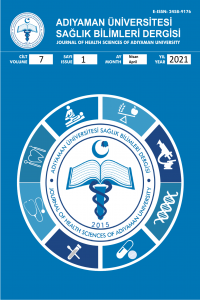Preterm doğum riski olan çoğul gebelerde akciğer maturasyonu için kortikosteroid kullanımı; Perinatal sonuçlar
Antenatal Kortikosteroid, Repratuvar Distres Sendromu, Çoğul Gebelikler
Use of corticosteroids for lung maturation in multiple pregnant at risk of preterm delivery; Perinatal outcomes
___
- 1. Kulkarni AD, Jamieson DJ, Jones Jr HW, Kissin DM, Gallo MF, Macaluso M, et al. Fertility treatments and multiple births in the United States. N Engl J Med 2013;369(23):2218–25.
- 2. Ward RM, Beachy JC. Neonatal complications following preterm birth. BJOG 2003;110:8–16.
- 3. Roberts D, Dalziel S. Antenatal corticosteroids for accelerating fetal lung maturation for women at risk of preterm birth. Cochrane Database Syst Rev 2006;3, CD004454.
- 4. Gyamfi C, Mele L, Wapner RJ, Spong CY, Peaceman A, Sorokin Y, et al. The effect of plurality and obesity on betamethasone concentrations in women at risk for preterm delivery. Am J Obstet Gynecol 2010;203(3):219.e1–5.
- 5. Blickstein I, Shinwell ES, Lusky A, Reichman B, in collaboration with the Israel Neonatal Network. Plurality-dependent risk of respiratory distress syndrome among very-low-birth-weight infants and antepartum corticosteroid treatment. Am J Obstet Gynecol 2005;192(2):360–4.
- 6. Booker WA, Gyamfi-Bannerman C. Antenatal Corticosteroids: Who Should We Be Treating? Clin Perinatol. 2018;45(2):181-198. doi: 10.1016/j.clp.2018.01.002.
- 7. Riskin-Mashiah S, Reichman B, Bader D, Kugelman A, Boyko V, Lerner-Geva L, Riskin A. Population-based study on antenatal corticosteroid treatment in preterm small for gestational age and non-small for gestational age twin infants. J Matern Fetal Neonatal Med. 2018;31(5):553-559. doi: 10.1080/14767058.2017.1292242
- 8. Melamed N, Shah J, Yoon EW, Pelausa E, Lee SK, Shah PS, Murphy KE; Canadian Neonatal Network Investigators. The role of antenatal corticosteroids in twin pregnancies complicated by preterm birth. Am J Obstet Gynecol. 2016;215(4):482.e1-9.
- 9. Vaz A, Malheiro MF, Severo M, Rodrigues T, Guimarães H, Montenegro N. Effect of antenatal corticosteroids on morbidity and mortality of preterm singletons and twins. J Matern Fetal Neonatal Med. 2018; 31(6):754-760. doi: 10.1080/14767058.2017.1297408.
- 10. Fillion A, Boutin A, Gareau-Léonard A, Labine L, Gasse C, Gaudreau C, Demers S, Bujold E. Use of Antenatal Corticosteroid Therapy: A Descriptive Study of Clinical Practice Trends. J Obstet Gynaecol Can. 2018 23. pii: S1701-2163(18)30523-1.
- 11. Gyamfi-Bannerman C, Son M. Preterm Premature Rupture of Membranes and the Rate of Neonatal Sepsis After Two Courses of Antenatal Corticosteroids. Obstet Gynecol. 2014;124(5):999-1003.
- 12. Haviv HR, Said J, Mol BW. The place of antenatal corticosteroids in late preterm and early term births Semin Fetal Neonatal Med. 2018 4. pii: S1744-165X(18)30112-4.
- 13. Sotiriadis A, Makrydimas G, Papatheodorou S, Ioannidis JP, McGoldrick E. Corticosteroids for preventing neonatal respiratory morbidity after elective caesarean section at term. Cochrane Database Syst Rev. 2018 Aug 3;8:CD006614.
- 14. Salem SY, Kibel M, Asztalos E, Zaltz A, Barrett J, Melamed N. Neonatal Outcomes of Low-Risk, Late-Preterm Twins Compared With Late-Preterm Singletons. Obstet Gynecol. 2017;130(3):582-590. doi: 10.1097/AOG.0000000000002187.
- Yayın Aralığı: Yılda 3 Sayı
- Başlangıç: 2015
- Yayıncı: ADIYAMAN ÜNİVERSİTESİ
İliak arter girişimi için transpedal yaklaşım: Nadir bir olgu sunumu
Suna TARKOÇİN, Besime BİLMEZ, Cihangir KAÇMAZ
Sistemik sklerozis ve sjögren sendromu olan hastada off-pump koroner arter baypas greft cerrahisi
Arda Aybars PALA, Temmuz TANER, Ahmet Burak TATLI
Ahmet onur Derin, Umut UNCU, Mahmut BOZKURT, Nazan ÇELİK, Fatoş UNCU, İhsan HALİFEOĞLU
Murat Eren ÖZEN, Aysun KALENDEROĞLU, Mustafa ÇELİK, Mehmet Hamdi ÖRÜM, Çiçek HOCAOĞLU
HEMŞİRELERİN CERRAHİ HASTASININ BESLENMESİ KONUSUNDA BİLGİ, TUTUM VE UYGULAMALARININ İNCELENMESİ
Günübirlik Cerrahide Hasta Konforu Ve Hasta Konforunu Etkileyen Etmenler
Cevriye ÖZDEMİR, Rabia YAMAN, Merdiye ŞENDİR
EVALUATION OF FORENSIC CASES ASSOCIATED WITH NEUROCHIRURGY ADMITTED TO EMERGENCY CLINIC
